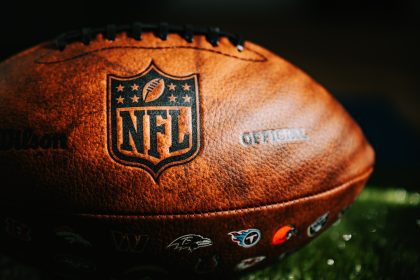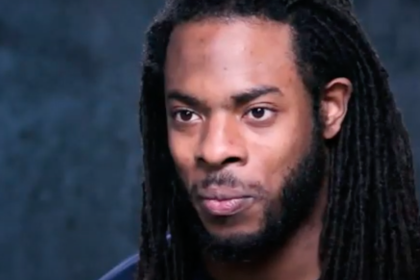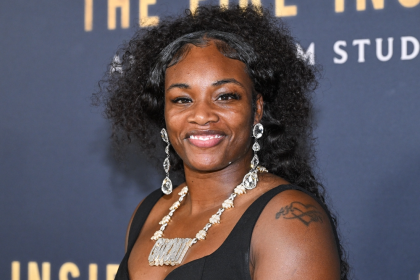
Richard Sherman‘s boisterous postgame interview, just minutes after his Seattle Seahawks defeated the San Francisco 49ers in the NFC championship to send the ‘Hawks back to the Super Bowl for the first time since 2005, became an instant viral hit. The emotional cornerback gave a fiery response to FOX reporter Erin Andrews, ranting about being disrespected by Niners receiver Michael Crabtree and how he’s the best corner in the game. Sherman’s emotion, Andrews’ befuddled expression — it all makes for a hilarious on-camera “moment.”
But lots of people aren’t laughing.
Sherman’s rant immediately garnered derision, criticism and hate from many people watching. Social media was overrun with posts about Sherman’s supposed thuggishness and how inappropriately he’d behaved. Race was almost instantaneously thrown into the mix — one of the more hateful remarks suggested that murderer George Zimmerman be allowed to “take care of” Sherman. But the scathing commentary didn’t just come from bigoted non-black people who were appalled by Sherman — a lot of it came from hand-wringing blacks who felt “embarrassed” and “ashamed” that Sherman would react as he did.
Countless posts about the defensive back’s “ignorance” and “foolishness” — code words that many black people toss around when we feel ashamed of the public behavior we see exhibited by one of our own; even more posts reciting Sherman’s pedigree (“He went to Stanford!” “He’s actually very intelligent”), and posts questioning whether or not young black men have lost all facility as it pertains to dignity and intelligence–they were everywhere in the hours following the game.
A similar backlash occurred just a week earlier, when Heisman trophy winner Jameis Winston gave a post-game interview after leading the Florida State Seminoles to victory in the BCS championship game. To some watching, Winston’s aw-shucks demeanor and country-isms were shameful, and the criticism was swift and harsh. To them, he was a bumpkin speaking “bad English,” a black man who should be ashamed of the fact that he sounded so “unintelligent” on the national stage.
Both Sherman and Winston were being themselves. And in being themselves, neither did anything that was disrespectful or wrong. There were no curse words. There was no “thuggery.” One guy was super emotional. The other guy was humble and resigned and happened to sound like a small-town country boy. The backlashes against their TV appearances reveal more about us than anything else. As black people, it’s obvious that we are still very uncomfortable in our own skin.
The “how does this make us look?” conditioning that we have endured for generations continues to manifest itself in our reactions to incidents like these. Jameis Winston doesn’t sound all that different from Charles Barkley — another product of small-town Alabama — or Muhammad Ali, who grew up in Louisville, Ky. But we don’t believe that black people should “talk like that,” especially when white folks’ are watching. “He should learn to speak better.” Diction and speech classes could behoove a lot of Americans, so if you’re concerned about him bettering himself — that’s great. If you’re saying it because you’re embarrassed for him or for us as a people — you need to check yourself. When we hear country-isms from a white southern athlete, it’s “folksy.” When we hear them from a black southern athlete, it’s “ignorant.”
As for Sherman, we see the exact same type of behavior on the sidelines and in the locker rooms. Amped-up football players are nothing new. But Sherman was standing next to a white woman. And that white woman looked confused or nervous. So we internalize her reaction and the reactions of other white people who may be watching. Ask yourself this–and be honest with yourself when you answer: If Sherman had the exact same reaction, but was being interviewed by black, male NFL commentator Curt Menefee, would we react so strongly? Would we laugh and move on–as opposed to shaking our heads and wondering “what is the world coming to?”
As black people, we have to sort out the baggage that centuries of continued racism forces upon us. And a big part of sorting through that baggage is working to rid ourselves of the shame of blackness. Richard Sherman or Jameis Winston aren’t any more or less us than Barack Obama and Denzel Washington; the only reason why we place so much weight on the things we view as “negative” is because we’ve been taught that “one bad” black person spoils it for everyone. That’s the worst kind of racism. And we shouldn’t play into it. If Riley Cooper doesn’t represent all white people, than Richard Sherman doesn’t represent all blacks. When you understand that, you can just watch the interview, have a chuckle, and move on. No big deal.
And let’s please remember to not overreact to things like this. Especially considering these two very successful black athletes did absolutely nothing wrong in these postgame interviews. So what do they–or any of us–have to be ashamed of?














